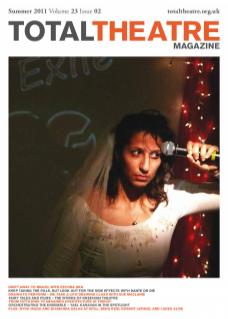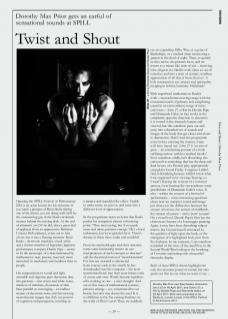Opening the SPILL Festival of Performance 2011 is an artist known for his reticence: if you catch a glimpse of Ryoji Ikeda during one of his shows, you are doing well: he’ll be the unassuming guy in the black turtleneck sweater behind the mixing desk. At the end of datamatics [ver.2.0] he did, after a great deal of applause from an appreciative Barbican Concert Hall audience, come out to take a bow, but it was a fleeting moment. Ryoji Ikeda – electronic musician, visual artist, and a former member of legendary Japanese performance company Dumb Type – seems to fit the stereotype of a man fascinated by mathematics: neat, precise, reserved, more interested in machinery and numbers than in people.
His compositions in sound and light assemble and organise pure electronic data into patterns – sine waves and white noise, matrices of numbers, thousands of thin lines parallel or converging – an endless stream of electronic noise and fast-moving monochrome images that defy our powers of cognition and perception, resulting in a mantra-and-mandala-like effect. Unable to make sense, we give in, and enter into a different level of appreciation.
In the programme notes we learn that Ikeda pushes his computers almost to breaking point: ‘They start crying, but if you push more and more, patterns emerge.’ He’s a hard taskmaster, but we’re grateful for it. There’s theatre in them there codes and crucibles!
From his methodologies and their outcome come some fascinating teasers on our interpretation of such concepts as ‘abstract’ and the theatrical notion of ‘transformation’. For this raw material is abstracted from sources such as the emails he has downloaded onto his computer – the texts transformed back into their pure binary code of zeroes and ones. Words become numbers; all is nothing or one – a nice thought! And out of this mass of mathematical systems, pictures emerge – yes, constructed by our brains, but isn’t that always the way? Is it so different to the fire casting shadows on the walls of Plato’s cave? Thus, we suddenly see an expanding Milky Way, or a game of Battleships, or a medical chart monitoring a patient in the dead of night. Then, as quickly as they arrive, the pictures leave, and we return to a trance-like state of just – receiving. Like all great art, Ikeda’s work takes us out of ourselves and into a state of ecstatic, wordless appreciation of all that is ‘more than us’. A holy communion: art, science and spirituality merging in holistic harmony. Hallelujah!
With superficial similarities to Ikeda’s work – monochrome moving image with the occasional touch of primary red; earsplitting sound in an extraordinary range of notes and tones – Schrei 27, a film by Davide Pepe and Diamanda Galás, in fact works in the completely opposite direction to datamatics: it is rooted in the intensely human and visceral, but this somehow pans out and away into a detached set of sounds and images of the body that get closer and closer to abstraction. Had I read the programme notes before entering the cinema, I may well have stayed out: Schrei 27 is ‘an aria of pain… an unrelenting portrait of a body suffering torture within a medical faculty’. Yet it somehow, oddly, isn’t disturbing: the end result is something that has the deep and dark beauty of a Passion play, appropriately enough for Good Friday. I suppose I didn’t find it disturbing because I didn’t know what I was supposed to be viewing/hearing, so I wasn’t hearing the screams of a tortured person, I was hearing the extraordinary sonic possibilities of Diamanda Galás’s voice. It also – within the context of a festival of performance – raises interesting questions about how we interpret sound and image: just where are the differences between the scream of torture, the scream of childbirth, the scream of ecstasy – and a ‘pure’ scream? On a visual level: Davide Pepe’s film has the chiaroscuro beauty of a Caravaggio painting. Again, it may have been disturbing subject matter, but I found myself entranced by the qualities of light upon the body, or the emergence of a highlighted body part from the darkness. In my response, I am somehow reminded of the story of the small boy in the Second World War looking at the bombing of Coventry and seeing only a beautiful fireworks display.
Both of these SPILL shows highlight not only the awesome power of sound, but also point out that we see what we want to see…
Dorothy Max Prior saw Ryoji Ikeda’s datamatics [ver.2.0] on 18 April 2011, and Schrei 27, a film by Davide Pepe and Diamanda Galás, on 22 April 2011. Both were presented at the Barbican, London as part of the SPILL Festival of Performance 2011.

